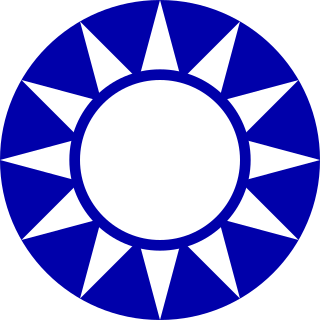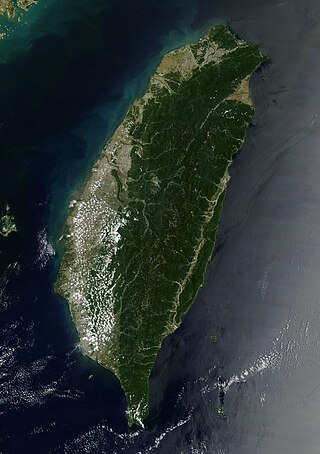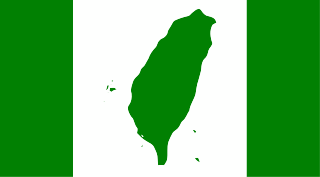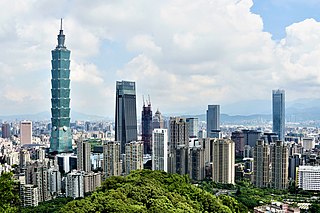
Bubble tea is a tea-based drink that originated in Taiwan in the early 1980s. Taiwanese immigrants brought it to the United States in the 1990s, initially in California through regions including Los Angeles County, but the drink has also spread to other countries where there is a large East Asian diaspora population.

The Democratic Progressive Party (DPP) is a Taiwanese nationalist and centre to centre-left political party in Taiwan. It is currently the major ruling party in Taiwan, controlling both the presidency and the central government, also the dominant party in the Pan-Green Coalition.

The Kuomintang (KMT), also referred to as the Guomindang (GMD), the Nationalist Party of China (NPC) or the Chinese Nationalist Party (CNP), is a major political party in the Republic of China, initially based on the Chinese mainland and then in Taiwan since 1949. The KMT is a centre-right to right-wing party and the largest in the Pan-Blue Coalition. Its primary rival is the Democratic Progressive Party (DPP) and its allies in the Pan-Green Coalition. As of 2024, the KMT is the largest single party in the Legislative Yuan. The current chairman is Eric Chu.

Kaohsiung, officially Kaohsiung City, is a special municipality located in southern Taiwan. It ranges from the coastal urban center to the rural Yushan Range with an area of 2,952 km2 (1,140 sq mi). Kaohsiung City has a population of approximately 2.73 million people as of October 2023 and is Taiwan's third most populous city and largest city in southern Taiwan.

Taiwan, officially the Republic of China (ROC), is a country in East Asia. It is located at the junction of the East and South China Seas in the northwestern Pacific Ocean, with the People's Republic of China (PRC) to the northwest, Japan to the northeast, and the Philippines to the south. The territories controlled by the ROC consist of 168 islands with a combined area of 36,193 square kilometres. The main island of Taiwan, also known as Formosa, has an area of 35,808 square kilometres, with mountain ranges dominating the eastern two-thirds and plains in the western third, where its highly urbanized population is concentrated. The capital, Taipei, forms along with New Taipei City and Keelung the largest metropolitan area. With around 23.9 million inhabitants, Taiwan is among the most densely populated countries.

Taiwan, officially the Republic of China (ROC), is an island country in East Asia. The island of Taiwan, formerly known as Formosa, makes up 99% of the land area of the territories under ROC control. The main island is 35,808 square kilometres (13,826 sq mi) and lies some 180 kilometres (112 mi) across the Taiwan Strait from the southeastern coast of the People's Republic of China (PRC). The East China Sea lies to the north of the island, the Philippine Sea to its east, the Luzon Strait directly to its south and the South China Sea to its southwest. The ROC also controls a number of smaller islands, including the Penghu archipelago in the Taiwan Strait, the Kinmen and Matsu Islands in Fuchien near the PRC's coast, and some of the South China Sea Islands.

The Taiwan independence movement is a political movement which advocates the formal declaration of an independent and sovereign Taiwanese state, as opposed to Chinese unification or the status quo in Cross-Strait relations.

Taiwanese indigenous peoples, also known as Formosans, Native Taiwanese or Austronesian Taiwanese and formerly as Taiwanese aborigines or Gaoshan people, are the indigenous peoples of Taiwan, with the nationally recognized subgroups numbering about 569,000 or 2.38% of the island's population. This total is increased to more than 800,000 if the indigenous peoples of the plains in Taiwan are included, pending future official recognition. When including those of mixed ancestry, such a number is possibly more than a million. Academic research suggests that their ancestors have been living on Taiwan for approximately 15,000 years. A wide body of evidence suggests that the Taiwanese indigenous peoples had maintained regular trade networks with numerous regional cultures of Southeast Asia before the Han Chinese colonists began settling on the island from the 17th century, at the behest of the Dutch colonial administration and later by successive governments towards the 20th century.

Taipei, officially Taipei City, and previously known as Taihoku from 1895 to 1945, is the capital and a special municipality of the Republic of China, commonly known as Taiwan. Located in Northern Taiwan, Taipei City is an enclave of the municipality of New Taipei City that sits about 25 km (16 mi) southwest of the northern port city of Keelung. Most of the city rests on the Taipei Basin, an ancient lakebed. The basin is bounded by the relatively narrow valleys of the Keelung and Xindian rivers, which join to form the Tamsui River along the city's western border.

Taiwanese Hokkien, or simply Taiwanese, also known as Taiuanoe, Taigi, Taigu, Taiwanese Minnan, Hoklo and Holo, is a variety of the Hokkien language spoken natively by more than 70 percent of the population of Taiwan. It is spoken by a significant portion of those Taiwanese people who are descended from Hoklo immigrants of southern Fujian. It is one of the national languages of Taiwan.
The controversy surrounding the political status of Taiwan or the Taiwan issue is an ongoing dispute on the political status of Taiwan, currently controlled by the Republic of China (ROC). This dispute arose in the mid-twentieth century.
The term One China may refer, in alphabetical order, to one of the following:
"Chinese Taipei" is the term used in various international organizations and tournaments for groups or delegations representing the Republic of China (ROC), a country commonly known as Taiwan.
The New Taiwan dollar is the official currency of the Republic of China. The New Taiwan dollar has been the currency of the island of Taiwan since 1949, when it replaced the old Taiwan dollar, at a rate of 40,000 old dollars per one new dollar. The basic unit of the New Taiwan dollar is called a yuan (圓) and is subdivided into ten chiao (角), and into 100 fen (分) or cents, although in practice both chiao and fen are never actually used.

The Chinese people, or simply Chinese, are people or ethnic groups identified with China, usually through ethnicity, nationality, citizenship, or other affiliation.

Cross-Strait relations are the relations between China and Taiwan.

Taiwanese Mandarin, frequently referred to as Guoyu or Huayu, is the variety of Mandarin Chinese spoken in Taiwan. A large majority of the Taiwanese population is fluent in Mandarin, though many also speak a variety of Min Chinese known as Taiwanese Hokkien, commonly called Minnanyu, Southern Min, or Hokkien. This language has had a significant influence on Mandarin as spoken on the island.

Tsai Ing-wen is a Taiwanese politician who has been serving as the 7th president of the Republic of China (Taiwan) since 2016. A member of the Democratic Progressive Party (DPP), Tsai is the first female president of Taiwan and the second to be born in Taiwan after the end of the Chinese Civil War in December 1949. She served as chair of the DPP from 2020 to 2022, as well as from 2014 to 2018, and from 2008 to 2012. Her second presidential term is due to expire on 20 May 2024, when she will be succeeded by Lai Ching-te.
The term "Taiwanese people" has various interpretations. It may generally be considered the people living on the island of Taiwan who share a common culture, ancestry and speak Mandarin, Hokkien, Hakka, or indigenous Taiwanese languages as a mother tongue. Taiwanese people may also refer to the indigenous peoples of the areas under the control of the Government of the Republic of China since 1945, including Kinmen and Matsu Islands that collectively form its streamlined Fujian Province. However, the inhabitants of Kinmen and the Matsu Islands themselves may not consider the "Taiwanese" label to be accurate as they are a part of Fujian and not Taiwan. They have a distinctive identity from that of the Taiwanese; viewing themselves as Kinmenese or Matsunese, respectively, or as simply Chinese.

The island of Taiwan, together with the Penghu Islands, became a dependency of Japan in 1895, when the Qing dynasty ceded Fujian-Taiwan Province in the Treaty of Shimonoseki after the Japanese victory in the First Sino-Japanese War. The consequent Republic of Formosa resistance movement on Taiwan was defeated by Japan with the capitulation of Tainan. Japan ruled Taiwan for 50 years. Its capital was located in Taihoku (Taipei) led by the Governor-General of Taiwan.















